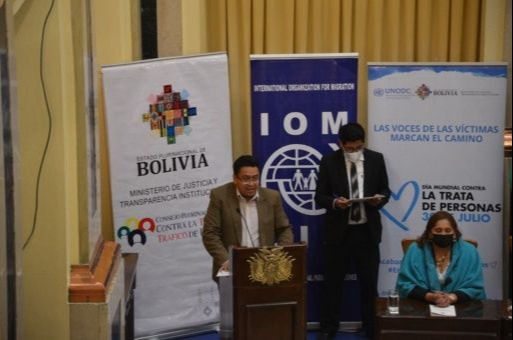
In Bolivia, 67% of the victims of human smuggling or trafficking are women. | Photo: @MinJusticiaBol
La Paz, July 31 (RHC)-- The Plurinational Government of Bolivia has presented a policy and strategy against human trafficking, smuggling of migrants and related crimes 2021-2025, in the context of the celebration of the World Day against Trafficking in Persons.
It involves 12 strategic actions to address this crime that affects the fundamental rights of the population to life, liberty and sexual freedom; the amendment of the Comprehensive Law Against Trafficking and Human Trafficking No. 263 of July 2012; as well as the allocation of resources for the prevention and punishment of this scourge.
In this sense, the Deputy Minister of Justice and Fundamental Rights, César Siles, expressed that "it is a fight and a crusade of all, the national government, autonomous governments, families, schools, media and other actors."
Under the slogan "Joining efforts", the National Government, governors, mayors, media, schools and family, among other actors, will fight against these crimes, which affect the fundamental rights to life, liberty and sexual freedom.
The deputy minister noted that it is the third most profitable crime on a global scale after drug trafficking and arms trafficking; while detailing that criminals have diversified ways to capture victims through social networks such as Facebook or Instagram; and in correspondence it is necessary to pay vital attention to prevention.
Regarding this, he pointed out that the current regulation was more than ten years old and "it served as a valid legal instrument, we have people convicted, around 400 processes in progress, but we need to update the regulation, we need to attend with this regulation the new ways of capturing victims that, with the evolution, modernity and technology have also evolved."
In addition to this, we need to allocate sufficient resources to the Police, the Prosecutor's Office and other investigative agencies, "in line with the challenges of the fight against human trafficking (...) We will make efforts to allocate more resources to prevention and punishment", said the senior official.
Research also shows that, with respect to the age of the victims, the highest number is between 11 and 20 years of age with 46.9 percent, 38.8 percent being adolescents; and followed by victims between 21 and 30 years of age, which represent 13.9 percentage points.

